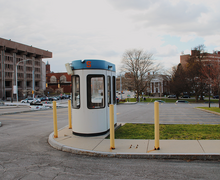Ojinnaka uses football to cope with dad’s death
Signing day should be a blue-chip high school football player’s happiest moment.
The hours spent studying playbooks, late nights lifting weights, summer three-a-days – all worth it for that one minute when the cameras flash and the dream is realized.
Not so for Syracuse freshman offensive tackle Quinn Ojinnaka.
Last February, on the day Ojinnaka signed with Syracuse, he didn’t smile and picture himself playing football on the Carrier Dome turf. His mind couldn’t focus on his proud past or bright future. It was stuck in a painful present.
His thoughts were miles away from Syracuse, in a small town in Nigeria where Pete Ojinnaka, Quinn’s father, was being buried.
The two, Quinn and Pete, last spoke in Quinn’s junior year at Maryland’s DeMatha High, when Quinn fruitlessly tried to explain the sport he loved to his father. Pete lived in his native Africa while Quinn lived with his mother, Becky, in Seabrook, Md.
But on signing day, none of that mattered. Ojinnaka may have been oceans away, but his mind never wandered from his dad’s burial.
‘All I could think about was my dad,’ Ojinnaka said. ‘I was close enough.’
So Ojinnaka mourned on the shoulder of Becky and his football coach at DeMatha, Bill McGregor. Not one to dwell, Ojinnaka needed a distraction. He moved on by becoming entrenched in his new life – becoming a Syracuse football player.
With McGregor’s help, Ojinnaka obtained his copy of the SU playbook early and studied it intently enough to learn one of the Big East’s most complex offenses in a few months.
Quinn also set up shop in DeMatha’s weight room, packing on muscle to his 6-foot-5 frame. He’s listed at 264 pounds, but looks heavier.
‘He’s a hard worker,’ center Nick Romeo said. ‘He’s dedicated himself to the program.’
‘He wants to do well,’ McGregor said. ‘He’ll do anything you want him to do.’
That diligence convinced the SU coaching staff to make Ojinnaka a second-stringer rather than redshirt him. So far Ojinnaka has seen limited action – he played a few series in Syracuse’s blowout of Rhode Island and the final, meaningless play against Pitt.
Still, he travels with the Orangemen to all their road games and is one injury away from becoming a starter.
‘I don’t think it’s a waste (not to redshirt),’ Ojinnaka said. ‘I’m happy because it gives me experience for next year. I just try to go week by week, work harder and try to compete.’
Ojinnaka’s non-redshirt status came as somewhat of a surprise. His incoming weight was 50 pounds lighter than many of his new linemates. Even McGregor suggested he redshirt.
‘Where I’m coming from, the size really doesn’t matter if you have the heart,’ Ojinnaka said. ‘It’s always about who has the biggest heart.’
Maybe that explains Ojinnaka’s early success at Syracuse.
Along with the absence of his father, Ojinnaka’s mom was often absent because of her career. Becky publishes the magazine World Achievers out of Nigeria, where she was raised, and frequently travels there for extended periods of time. Ojinnaka said he’s extremely close with his mom. But when she was gone, McGregor became a parental figure for him.
Ojinnaka lived with Pete and Becky in Nigeria from age 1 to 3, but remembers none of it. He wants to someday visit his parents’ homeland, but for now he relies on his roommate, Kader Drame, for a connection to Africa. Drame, a fellow freshman tackle, was born and raised in Senegal. They talk about anything from blocking assignments to family roots.
Ojinnaka and his mother speak over the phone regularly, whether she’s in Nigeria or Maryland.
‘Every time (my mother) saw me on ESPN (during the Auburn game),’ Ojinnaka said, ‘she’d be like, ‘I saw my baby. I saw my baby.’ ‘
And what would Pete Ojinnaka have felt had he seen his boy wear the blue and orange, playing a game he knew nothing of?
Said Quinn: ‘He would have been proud.’
Published on October 8, 2002 at 12:00 pm





